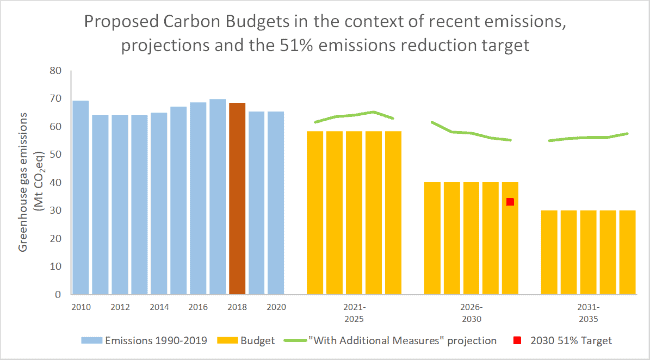Conor Minogue, Senior Policy Executive, Ibec, explores what the Climate Act 2021 means for Irish business.
Last July, the Climate Action and Low Carbon Development (Amendment) Act 2021 was signed into law, requiring Ireland to halve its carbon emissions by 2030, and keep all economic and demographic growth within a reducing carbon envelope. For many businesses, this is an opportunity to double-down on green investments and leverage Ireland’s zero carbon direction for commercial gain. For others, especially those with few opportunities to reduce emissions, it threatens entire business models and industrial competitiveness.
A decoupling of emissions and economic growth
The Climate Bill establishes a system of reducing carbon budgets to ensure emissions fall over time. To meet our 2030 target, Ireland cannot emit more than 295 million tonnes of CO2e over the five-year period to 2025, and 200 million tonnes between 2026 and 2030. For an economy that emitted 68.3 million tonnes in 2018 (the reference year), this means average annual emissions must fall by 4.8% between now and 2025, and by 8.3% between 2025 and 2030. Putting this challenge in perspective, emissions only fell by 3.6% in 2020 – during a year of enforced economic shutdown. Meeting this trajectory in a way that does not suppress growth will require enormous investment, society-wide behavioural change, mass fuel switching, and some very timely innovations.

The above graph represents the proposed carbon budgets in the context of recent historic emissions, and the EPA “With Additional Measures” projections of emissions based on the implementation of the old 2019 Climate Action Plan. Source: The Climate Change Advisory Council
The power sector to do the heavy lifting
Sectoral emission ceilings will soon be announced for each five-year period, with enforcement falling to the closest minister responsible. Last month, Government published its 2021 Climate Action Plan, setting out a roadmap of 475 actions to help Ireland meet its climate ambition. The plan sets out the expected contributions of key sectors. It is envisaged that the power industry will do most of the heavy lifting and deliver up to 80% renewable generation by 2030. This gives hard-to-decarbonise sectors like agriculture and industry some reprieve, while providing a renewable option for sectors that can electrify. However, industry will still be required to reduce emissions by 29-42% by 2030.
Green investment as a win-win
The business case to move away from fossil fuels and improve energy efficiency is stronger than ever. Carbon prices are rising, energy prices are at their highest point in years, and supply is struggling to meet demand. Moreover, consumers and investors are increasingly placing a premium on green enterprise. Motivated by these factors, a growing share of Ireland’s highest emitters have opted to overtake the legislation and sign up to significantly more demanding Science Based Targets. However even these businesses could be impacted. Typically, these corporations manage carbon at a global level, whereas Ireland’s regime does not give credit for mitigation or carbon removals beyond the border. Expansion in Ireland must be either zero carbon or offset by removals elsewhere in the economy.
Supports for business will be critical
For most businesses, the upfront costs, payback, and lack of in-house expertise remain barriers to action. For the 50% of businesses who lease their properties, the payback is even less attractive. And for businesses with HGV fleets and high temperature processing, there is no clear alternative commercially available. These businesses will need additional time and could well be the last sectors to decarbonise.
The soon-to-be launched Climate Toolkit 4 Business will help companies navigate the complex world of state supports and be a first port of call for any business starting their decarbonisation journey. However, the supports themselves will need to be better designed to meet business needs and a new policy will be required to support joint landlord-tenant action.







